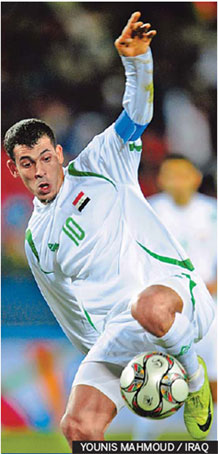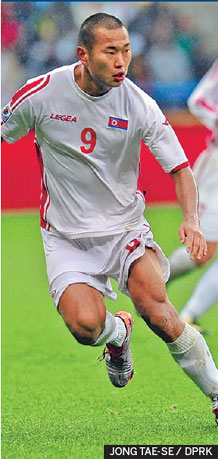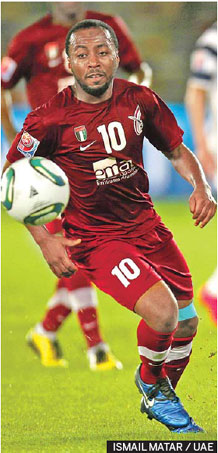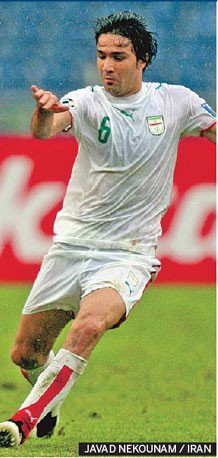Asian Cup 2011 preview-Group D: no clear-cut favorite


Fierce archrivals and dark horses to clash in extremely competitive section at Doha tournament
Defending champ eyes unlikely title
Iraq stormed to shock Asian Cup glory in 2007 against the backdrop of war, but it will have to spring another major upset if it is to repeat the emotional feat in Qatar.

The Iraqi team made headlines worldwide and was welcomed home as heroes after it defeated Saudi Arabia 1-0 in Jakarta four years ago to momentarily take the spotlight off the violence in the war-ravaged country.
But it faces a stiff task to even make it to the knock-out stages this time after it was drawn in a highly competitive Group D that also includes archrival Iran, World Cup finalist Democratic People's Republic of Korea (DPRK) and the United Arab Emirates.
Experienced coach Wolfgang Sidka, who has only been in the job since the summer, has kept the bulk of the squad that brought Iraq its greatest ever soccer triumph, complemented by a sprinkling of young prospects.
However, it remains to be seen if the former Werder Bremen coach has had enough time to get his footballing philosophy across to his charges and they are not among the favorites in Qatar.
Sidka is making no promises. 
"I think we should try to do it (win the tournament) again," said the German, who has extensive coaching experience in the region.
"But first we have the match with Iran - and that is our neighbor and our rival - and then our target is to reach the quarterfinals.
"We have a tough group also with North Korea, which played at the World Cup, and also UAE, which played well at the Gulf Cup even though it was missing a lot of players, so let's see. We'll try to reach the quarterfinals and then we will see."
Dogged striker Younis Mahmoud, who scored the 71st-minute winner in the final four years ago, remains central to Iraq's hopes and is its talisman.
Nashat Akram, a clever midfielder, is also a pivotal figure that will need to be in top form if Iraq is to make it out of the group and beyond.
"What I have always said from the beginning is that we should improve step by step," said Sidka, who believes up to 10 sides are capable of winning the Asian Cup.
"We are trying to do better and we know this is a very tough competition. Maybe from 16 teams, 10 are able to get the Asian Cup."
Sidka's men start the defence of their Asian Cup crown on Jan 11 at the Al Rayyan Stadium against traditional heavyweight Iran in what promises to be a tasty showdown between the neighbors and rivals.
Iraq plays the UAE four days later and the DPRK on Jan 19.
Iran coach Afshin Ghotbi, who believes Group D is the toughest at the tournament, expects Iraq to be a significant threat.
"Iraq are coming here as champions and they have the confidence that comes with being champions and they have enough of the quality players who helped them achieve that championship still with the team," he said.
But Iraq's build-up has not been outstanding and there is a general feeling the team peaked in 2007.
A series of friendlies against regional rivals in November and December have shown few signs Iraq is capable of another shock - but Sidka's side appears to revel under the "underdog" tag.
DPRK seeks World Cup redemption
The DPRK goes into battle at the Asian Cup this month hoping to banish bitter memories of a humiliating World Cup and emulate the achievements of its all-conquering junior side.

The DPRK opens its title quest in Qatar against unfancied United Arab Emirates on Jan 11 in Group D.
Attempting to second-guess anything related to the world's most secretive country is no easy task.
But soccer is hugely popular in the country, whose under-16 and under-19 teams this year won their respective Asian titles, underlining the potential.
There were reports the hardline DPRK leadership was furious at the senior side's capitulation at the World Cup in South Africa, where it impressed in losing only 2-1 to Brazil in its opening game.
But the wheels then came off in spectacular fashion, as Portugal humiliated it 7-0 before it lost 3-0 to Cote d'Ivoire, the DPRK team finishing bottom of the group and returning home to an uncertain fate without a single point.

However, it will be more comfortable in Qatar, where the standard will not be as high.
Iran coach Afshin Ghotbi expects the Koreans to be stubborn opponents.
"DPR Korea will make life difficult for every team, just like they did for Brazil at the World Cup in South Africa," he said. "They are compact in defence and that will be a challenge for every team, while they also can be dangerous on dead balls and on the counterattack."
Prolific striker Jong Tae-se - dubbed "Asia's Wayne Rooney" for his combative style - is expected to again lead DPRK's frontline. Jong averages a goal every other game for a defence-minded team.
German second division side VfL Bochum snapped up the Japan-born 26-year-old after he impressed in South Africa, Jong's fast start to life in European soccer has boosted his reputation as one of Asia's most fearsome predators.
Fellow forward Hong Yong-jo, the captain who plays in Russia for FC Rostov, is another to look out for.
Despite the decent striking options, the DPRK will rely on a tried-and-tested defensive formation that served it well in making its first World Cup since 1966.
It enjoyed a bye to the Asian Cup after winning the AFC Challenge Cup in February, stumbling past Turkmenistan 5-4 on penalties in the Sri Lankan capital Colombo to earn a ticket for Qatar.
The DPRK has been preparing for the Asian Cup in Egypt, where it suffered a 2-1 defeat to fellow qualifier Kuwait in a low-key friendly.
Following its opener against the UAE - a game the players will fully expect to win - it plays Iran on Jan 15 and Iraq four days later in a group that looks like one of the tightest at the tournament.
'Dark horse' UAE plots major shocks
United Arab Emirates (UAE) is plotting to spring a surprise or two at the Asian Cup, where making the knockout stages would be a major achievement for the Group D minnow.

It opens its account in a tough-looking group on Jan 11 against World Cup finalist DPRK, followed by matches against defending champion Iraq and regional heavyweight Iran.
The UAE stormed to the Asian Cup finals for the eighth time thanks to a blistering start in qualifying that included a 5-0 thrashing of Malaysia, eventually finishing top of its group ahead of Uzbekistan.
"The Emirates is a team with a lot of quality young players who have less pressure," said Iran coach Afshin Ghotbi, who - like many pundits - rates Group D the toughest at the tournament.

"They are preparing for 2014 (World Cup qualifying) and that takes the pressure off the coach and that makes them the spoiler of the group, they are the dark horse in the group and that makes this group interesting," said Ghotbi, who is under pressure to deliver Iran's first Asian Cup in 35 years.
UAE coach Srecko Katanec took his unfancied but up-and-coming side to Oman for a week-long training camp ahead of the Asian Cup, where its best performance to date has been runner-up in 1996.
In November, Katanec's side thrashed hapless fellow Asian Cup finalist India 5-0, but results in recent friendlies have been mixed.
Nevertheless, UAE has seen its footballing profile boosted by hosting the Club World Cup in December, while ageing Italian star Fabio Cannavaro now plies his trade for club side Al Ahli.
A surprise silver at the Asian Games in November in Guangzhou, China, where it lost narrowly to Japan 1-0 in the final, reinforced the impression that exciting times might be just around the corner for the UAE.
Katanec has been widely applauded for his exploits with the national team.
The wily coach made his name leading his home nation Slovenia to Euro 2000 and the 2002 World Cup, proving he knows what it takes to steer an unfashionable national team into a major tournament.
Also pivotal to the UAE's prospects of getting out of Group D is striker Ismail Matar.
Capable of both scoring and creating, the clever 27-year-old is regarded as the best forward in the country and almost everything good about the UAE goes through him.
Their frontline also boasts young striker Ahmed Khalil, a talent who has been tipped as good enough to eventually make it in the European game.
The UAE, whose proudest ever achievement was an appearance at the 1990 World Cup in Italy, takes on reigning champion Iraq on Jan 15.
Iran out to end 35 years of hurt
The pressure is firmly on Iran to win its first Asian Cup in more than three decades this month and revive the glory days of the 1960s and 1970s.

It clashes with holder and archrival Iraq in a potentially explosive Group D.
Afshin Ghotbi is the man charged with ending 35 years of hurt for Iran, an Asian powerhouse that is among the better sides in Qatar but which has seen its dominance of the region wane badly in recent times.
"I think for a country like Iran, with its history, we have to always target the Asian Cup title," Ghotbi said.
"We've had to wait 35 years but maybe we can achieve it. I believe we have the quality to achieve it and history has always shown that."
However, Ghotbi's side goes into the tournament in patchy form that culminated in an uninspiring 0-0 draw with host Qatar in a warm-up match on Dec 28.

Ghotbi acknowledges the pressure is on the three-time champion, which won the tournament in 1968, 1972 and 1976 but crashed out disappointingly in 2007 in the quarterfinals to the Republic of Korea.
After the bore draw with Qatar, the under-pressure Ghotbi highlighted Japan's poor form in the run-up to the World Cup in South Africa, where the Japanese impressed in reaching the last 16.
"Japan in 2010, during its preparation saw some bad results but it had good results at the World Cup," said Ghotbi, who is to take over as coach of J-League side Shimizu S-Pulse in February.
He will be the first Iranian to manage in Japan but his decision to move there has led to accusations in football-mad Iran that Ghotbi is not entirely focused on the national side, which does not boast the talent of yesteryear.
"We have the team, we have prepared a good training program here in Qatar which has been very good for us and I believe that we will be ready on Jan 11 and the game that comes against Iraq," said Ghotbi.
Iran made it to the finals with ease, comfortably topping its qualifying group to ensure its participation in the finals for a record-equalling 12th time.
Javad Nekounam and Masoud Shojai of Spanish La Liga club Osasuna are two of the star performers for Iran, while midfielder Andranik Teymourian figured in the English Premier League for Bolton Wanderers and Fulham.
Ghotbi believes Group D is the toughest at the tournament.
"We have Iraq who are coming here as champions and they have the confidence that comes with being champions and they have enough of the quality players who helped them achieve that championship still with the team," he said. "The DPRK will make life difficult for every team, just like they did for Brazil at the World Cup in South Africa."
United Arab Emirates is the "dark horse" of the group, he said.
 0
0 







Go to Forum >>0 Comments